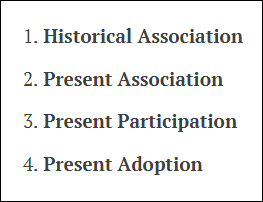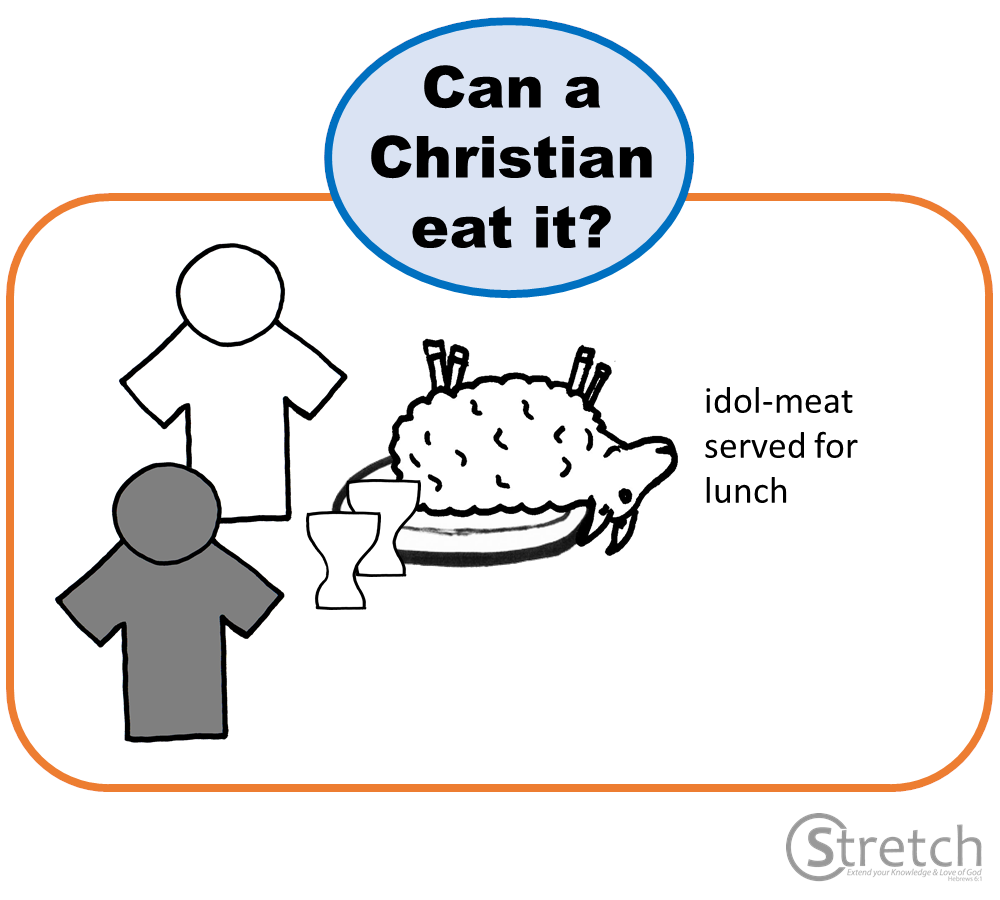Perceptive readers of the previous two posts in this series will anticipate what I’ve yet to say about how Christians should approach Halloween based on 1 Corinthians 8-10. In short, we saw that Christians must not participate in idolatrous and demonic practices, but that use of things merely associated with them doesn’t matter. This leaves an enormous amount of freedom for Christians to engage with Halloween. However, it does not mean that we should just do whatever we feel like.
There are three questions that should guide our engagement with a cultural practice such as Halloween. (God-willing, I plan to apply these principles to other topics in the near future).
Question 1: Is it Permissible for Christians?

What kind of connection does the practice have to false spirituality? I previously discussed four levels of connection that any practice might have. I observed that Christians are free to use things that are associated with false spirituality (#2), but that they are not free to participate in false spiritual activity (#3). This distinction is absolutely crucial. It doesn’t mean that we are free to use or engage in bad things. It simply means that good things cannot become spiritually contaminated by association with evil. Food is still intrinsically good even if it has been offered in sacrifice to idols.
An implication of all this is that Christians ought not fear demons or their influence. We mustn’t participate in any kind of engagement with them or their deceptions, but in Christ we have no reason to fear them. If demons could influence us through objects devoted to them then 1 Corinthians 8-10 would have to warn of the spiritual danger that food sacrificed to idols posed to us. In that case it would be spiritually poisonous to us! But the Bible doesn’t make that warning because no such danger exists.
However, Christians must not engage in any recognisably religious action that is not Christian. That would be to participate in falsehood and demonic deception. Anything that is not recognisably religious shouldn’t concern us, regardless of its historical background.
For example, the Halloween game of Bobbing for Apples was once used as a superstitious fortune-telling game. Does that mean that you can’t play it for fun? Of course not! Historical association doesn’t make it a present spiritual problem. I doubt anyone would mistake the activity of picking up apples with your mouth with a spiritual activity today.
A less clear example is treating once-believed religious myths as fiction (I previously mentioned the animated Hercules movie). These are false gods, or at least they once were. However, in my opinion they are now just cultural stories retold for entertainment. If there was any danger of promoting or participating in ancient Greek religion then Christians would need to firmly reject this kind of entertainment.
In sum, if a practice has a merely historically association with false spirituality (#1) don’t worry about it. If it involves participation in false religious activity (#3) stay away from it entirely. If it is presently merely associated with false religious activity (#2) then there are two other questions to ask…
Question 2: Is it Personally Beneficial or Harmful?
‘Christian freedom’ refers to the fact that Christians have been liberated from bondage to sin and to all manner of religious obligations and earnings. We don’t do good works to earn salvation; Jesus has earned that for us. We don’t need to observe the kinds of religious duties that Old Testament believers performed since these have been fulfilled in Christ. Christians must not replace these fulfilled Old Testaments rules with man-made ones (Colossians 2:21-23). We have been freed from such things.
However, Paul critiques two ways in which some Corinthian readers got this idea of Christian freedom wrong. First:
‘“I have the right to do anything,” you say– but not everything is beneficial. “I have the right to do anything”– but not everything is constructive.’
1 Corinthians 10:23
It is naïve to think (as some Corinthian Christians did) that we can do anything we want and that it will have no impact on us. Everything we experience influences us. This is why the Bible urges us to focus on good and wholesome things (Philippians 4:8). We must always give careful consideration to what we engage in and experience. Those of us who are parents must also do this for our children.
What does Halloween look like in your neighbourhood? Does it look like a celebration of death? I don’t want my kids learning that death, horror, and the supernatural are light-hearted, festive themes. On the other hand, if it is just local children approaching our neighbours (with supervision) then it could be a good community occasion to be a part of. We need to connect with our neighbours if we are ever going to be able to share the gospel with them.
What influence does Halloween having on you and your children? Some have found that for them Halloween has enlivened an interest in demonic things like Ouija boards, tarot cards, witchcraft, astrology, and spirit guides. Will Halloween have this kind of influence on you or your children? How will it affect your children’s faith in the Lord Jesus? How will it affect your faith? Is your involvement in Halloween a self-deceived way of delighting in things that God hates? You need to weigh up these things carefully and remain alert.
Following that, if our children are aware of Halloween at all then we owe it to tell them the gospel from a Halloween angle. Halloween looks like death and ghosts. So explain the resurrection and how Jesus has conquered death and has been exalted above every power there is (Ephesians 1:18-23). Tell them about the time Jesus met a man who was literally possessed by an army of demons, and how they all covered before him in pathetic terror (Mark 5:1-20). The Bible has better Halloween stories than the world does. Plus these stories are true!
There is no law here, only a question: is what you do on Halloween beneficial for you and your children, or is it harmful? Consider carefully and act wisely.
Question 3: Does it Serve Others or Does it Potentially Cause them Harm?
Paul’s main point in 1 Corinthians 8-10 is not about whether something is good for us, but whether it is good for others. In a word, this question is about love:
‘No one should seek their own good, but the good of others.’
1 Corinthians 10:24
Recall the background scenario of 1 Corinthians that I described previously. A man was converted out of idol worship. He had previously been enslaved to a false religion and still bore the psychological scars. He is understandably concerned to have no connection to the slavery of his past. For him food offered to idols seems spiritually poisonous.

Many would look down on his concern as a weakness that demonstrates his lack of understanding of the gospel. However the Apostle Paul calls on fellow-Christians to have compassion on anyone whose conscience is distressed by idol-food (1 Corinthians 8). It’s as simple as loving your neighbour.
This is the true purpose of Christian freedom. Christian freedom means that my decisions are not about me because I don’t need them to be. Worldly freedom is asserting that I can do whatever I want. Christian freedom is very different. It says: “I don’t need this for me, therefore I can use it to serve you”. It’s like a man with a full belly in possession of food. He doesn’t need it for himself, so he shares it with a needy neighbour.
Christian freedom flows from what Jesus wins us in the gospel. By his death and resurrection he has given us eternal life and forgiveness. We are saved by grace and therefore don’t need our works to serve ourselves. Jesus has already taken care of that for us.
Should I observe Halloween? I don’t care either way. To the extent that it doesn’t cause harm to me or my children, it’s a matter of indifference to me. That means that I should work out how to use Halloween to serve my neighbour. That was Paul’s attitude:
If an unbeliever invites you to a meal and you want to go, eat whatever is put before you without raising questions of conscience. But if someone says to you, “This has been offered in sacrifice,” then do not eat it, both for the sake of the one who told you and for the sake of conscience. I am referring to the other person’s conscience, not yours. For why is my freedom being judged by another’s conscience? If I take part in the meal with thankfulness, why am I denounced because of something I thank God for? So whether you eat or drink or whatever you do, do it all for the glory of God. Do not cause anyone to stumble, whether Jews, Greeks or the church of God– even as I try to please everyone in every way. For I am not seeking my own good but the good of many, so that they may be saved.
1 Corinthians 10:27-33
Culture makes a difference here (Jews, Greeks, etc). In communities with a consciousness of witchcraft or a different celebration of Halloween than I’ve experienced I would respond differently than I would among people who don’t believe in those things. What would remain unchanged is that I would aim to do what is best for my neighbour rather than for myself.
What I Plan to do on Halloween
Some people will want to know specifically what I plan to do for Halloween. The answer to that depends entirely on what my neighbours and doing and whether I can use the opportunity to serve them. If my community is outside in costumes then going outside to spend time with them is a great opportunity to spend time with them.
So I feel free to do Halloween if I want to, but I feel no obligation. I’ll certainly take the opportunity to talk to my children about Jesus’ defeat of demons and death. (I’ve toyed with the idea of a “Jesus is alive” kids party. That’s a genuinely Christian approach to any death-themed cultural holiday. But it also sounds a bit cheesy…).
Even if I do nothing for Halloween this year I retain the right to change my mind at any point, especially if it becomes useful for mission. If I see my neighbours ‘trick-or-treating’ with their kids, I have no concerns getting my kids to find some dress-ups and joining in. As a Christian I’m free to use Halloween or not use it as seems best able to serve others. Using Halloween for mission is a wonderful way to use it for the glory of God.
Part 1: Halloween & Christians
Part 2: Halloween, Idolatry, and Demons
Part 3: Serving Jesus with Halloween
